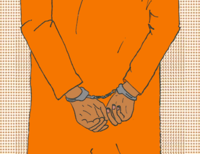Can you help us sustain this work?
Thank you,
Peter Wagner, Executive Director Donate
Written in November 2003 as a sidebar to "Do no harm" or "Do no expense"?: Ohio's prisoners are dying from inadequate medical care
International Law and Prisoner Health
By Peter Wagner
The Ohio Department of Correction and Rehabilitation's argument that economics force them to use substandard doctors for prisoners appears to violate international law which requires prisoners to be given the same treatment as the general community. In 1955, the United Nations adopted the Standard Minimum Rules for the Treatment of Prisoners laying out the minimum conditions suitable to the United Nations.
Paragraph 22 requires that prison medical services should be organized in close relationship with outside medical services, meaning as restated in a 1990 Resolution establishing Basic Principles for the Treatment of Prisoners: "Prisoners shall have access to the health services available in the country without discrimination on the grounds of their legal situation."
Contrary to the common U.S. practice of denying or stalling access to outside medical care, the Standard Minimum Rules give prisoners requiring specialized treatment the right to be transferred to special facilities or civilian hospitals. Common sense says that preventative dental care is necessary for long-term dental health, but the U.S. Constitution does not give prisoners the right to preventative dental care, only care to treat pain and discomfort. (Dean v. Coughlin 623 F. Supp. 392, 404 S.D.N.Y. 1985) Again, the Standard Minimum Rules go further than the U.S. Constitution, stating that every prisoner must have access to a "qualified dental officer."
The 1988 United Nations Resolution "Body of Principles for the Protection of All Persons under Any Form of Detention or Imprisonment" goes further than these other resolutions, holding in Principle 24 that "medical care and treatment shall be provided whenever necessary. This care and treatment shall be provided free of charge." While prisoner medical copayments may not have been invented when the 1955 Minimum Rules were being drafted, by the 1980s their oppressive character was clear enough for the international community to ban them.
The minimum rules do contain a provision recognizing that given the economic diversity around the globe, not all the rules are practical for application in all times and places. However, the U.N. also said that the rules should "serve to stimulate a constant endeavour to overcome practical difficulties in the way of their application." In the almost 50 years since their passage, the United States, despite having the world's largest economy, has not been able to meet even the United Nation's minimum rules.
The U.S. would likely argue that treating 2 million prisoners as human beings would cost too much. But it is hard to excuse the human rights violations of the richest country in the world when it squanders its wealth by choosing to lock up the world's largest population of prisoners.



